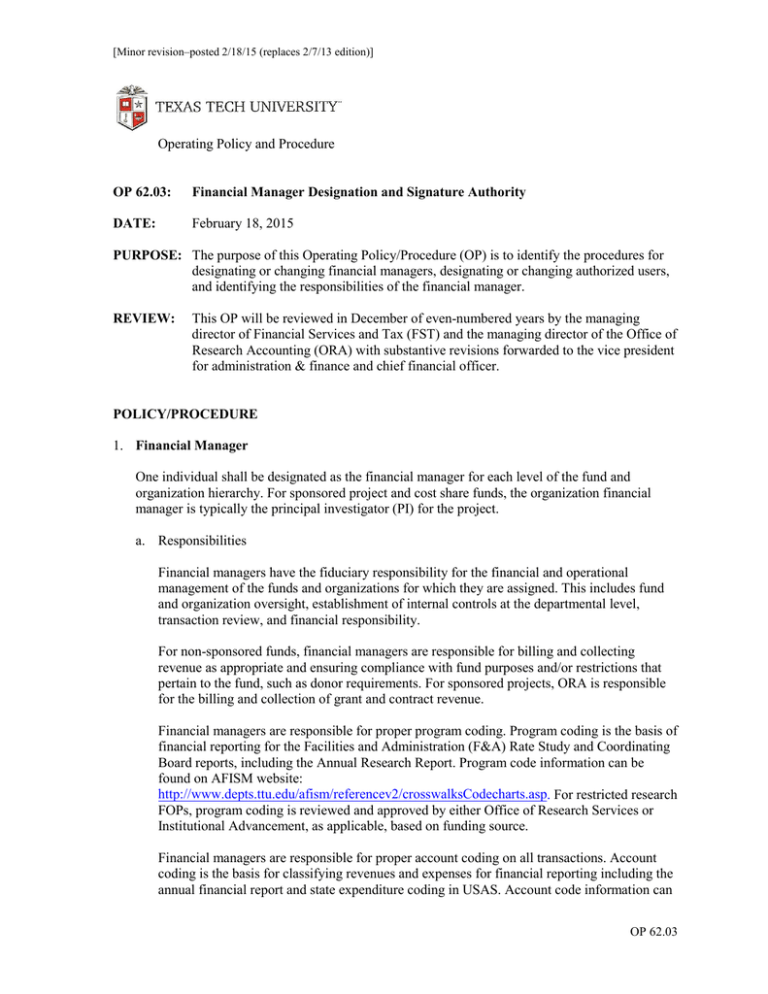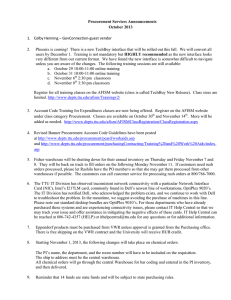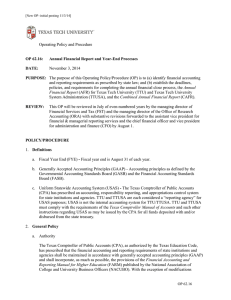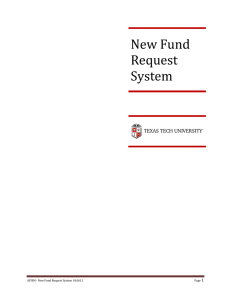Operating Policy and Procedure February 18, 2015
advertisement

[Minor revision–posted 2/18/15 (replaces 2/7/13 edition)] Operating Policy and Procedure OP 62.03: Financial Manager Designation and Signature Authority DATE: February 18, 2015 PURPOSE: The purpose of this Operating Policy/Procedure (OP) is to identify the procedures for designating or changing financial managers, designating or changing authorized users, and identifying the responsibilities of the financial manager. REVIEW: This OP will be reviewed in December of even-numbered years by the managing director of Financial Services and Tax (FST) and the managing director of the Office of Research Accounting (ORA) with substantive revisions forwarded to the vice president for administration & finance and chief financial officer. POLICY/PROCEDURE 1. Financial Manager One individual shall be designated as the financial manager for each level of the fund and organization hierarchy. For sponsored project and cost share funds, the organization financial manager is typically the principal investigator (PI) for the project. a. Responsibilities Financial managers have the fiduciary responsibility for the financial and operational management of the funds and organizations for which they are assigned. This includes fund and organization oversight, establishment of internal controls at the departmental level, transaction review, and financial responsibility. For non-sponsored funds, financial managers are responsible for billing and collecting revenue as appropriate and ensuring compliance with fund purposes and/or restrictions that pertain to the fund, such as donor requirements. For sponsored projects, ORA is responsible for the billing and collection of grant and contract revenue. Financial managers are responsible for proper program coding. Program coding is the basis of financial reporting for the Facilities and Administration (F&A) Rate Study and Coordinating Board reports, including the Annual Research Report. Program code information can be found on AFISM website: http://www.depts.ttu.edu/afism/referencev2/crosswalksCodecharts.asp. For restricted research FOPs, program coding is reviewed and approved by either Office of Research Services or Institutional Advancement, as applicable, based on funding source. Financial managers are responsible for proper account coding on all transactions. Account coding is the basis for classifying revenues and expenses for financial reporting including the annual financial report and state expenditure coding in USAS. Account code information can OP 62.03 February 18, 2015 Page 2 be found on AFISM website: http://www.depts.ttu.edu/afism/referencev2/crosswalksCodecharts.asp Financial managers should reconcile the funds and organizations for which they are assigned and correct any outstanding items to ensure recorded accurately. Financial managers are responsible for year-end fund deficits that exist on August 31 for FST funds. FST will notify financial managers of deficit balances at year-end and request instructions for clearing the deficit. Deficits not cleared within two business days of close will be cleared by FST from the default FOP listed on set-up or from other funds available to the financial manager. Fund deficits on internal service center funds will be accounted for consistent with TTU OP 62.23. b. Creation Financial managers are assigned to the associated fund and organization upon creation of the fund/organization code. For non-sponsored funds, this is done on the Fund Request Form and the FOP Combination Form upon FOP establishment. These forms can be found at http://www.depts.ttu.edu/fst/forms/. For sponsored project funds, the setup is performed by ORA upon establishment of the project in Banner. c. Change Requests For non-sponsored funds, financial manager change requests are processed by FST upon receipt of the Financial Manager Form found at http://www.depts.ttu.edu/fst/forms/. Changes to the financial manager for sponsored project and cost share funds may require sponsor approval and should be coordinated beforehand with the Office of Research Services. d. Signature Authority It is the department’s responsibility to maintain the financial manager’s signature authority for all FOPs managed by the department. This includes the responsibility to request the removal or change of terminated employees’ signature authority. 2. Delegation of Approval Authority through the Financial Profile The organization financial manager may delegate authority to the subsequent levels of approval for use in TechBuy and other financial applications. The organization financial manager is responsible for all activity associated with these organizations including the activities of the assigned delegates. This includes the responsibility to remove or change terminated employees’ signature authority. Any financial manager may delegate authority through the financial profile link on the Team Application at http://team.texastech.edu or through the TeamApp link on the Raiderlink under A&F Work Tools Tab under AFISM. TEAM Application instructions can found at the following link: http://www.depts.ttu.edu/afism/training/documents/TeamApp%20Instructions.pdf. OP 62.03 February 18, 2015 Page 3 The financial profile approval options are listed below. a. Approver The organization financial manager may delegate authority to an approver that gives authority to approve all financial transactions related to the funds/organizations for which the financial manager has fiduciary responsibility in all finance applications. b. TechBuy Requestor The organization financial manager may delegate authority to a requestor that gives authority to approve all transactions related to the funds/organizations for which the financial manager has fiduciary responsibility in TechBuy for transactions up to $5,000.00. c. TechBuy Shopper The financial manager may grant authority to a shopper that gives authority to shop/order items through TechBuy related to the funds/organizations for which the financial manager has fiduciary responsibility. The shopper has no authority to approve the transaction; the transaction is routed to the appropriate requestor or approver for approval. OP 62.03



